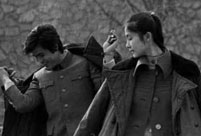 |
| People offer flowers near bronze statues of the DPRK late founder Kim-il Sung and late leader Kim-jong Il at Mansudae in Pyongyang on Dec 16, 2013, on the eve of the second death anniversary of Kim-jong Il. (Photo / Xinhua) |
Chinese observers believe execution of leader's uncle won't have major influence on economic projects.
Beijing said on Monday that it is keeping watch on Pyongyang and hopes there won't be a "major change" in the latter's policies, as the sudden execution of the country's powerful No 2 in command has brought fear of instability to the region.
Pyongyang assured its neighbor on Monday that its economic policies will not change despite the dramatic case of Jang Song-thaek, who has been labeled by foreign media as the top official driving the direction of the economy.
Observers said that ties between China and the Democratic People's Republic of Korea are unlikely to be affected by a single incident, but Beijing certainly has to watch for the aftermath of Pyongyang's personnel changes.
Jang, the uncle of DPRK top leader Kim Jong-un, used to be the top official entrusted by Pyongyang for high-level visits and economic cooperation with China. He used to lead delegations to China for negotiations on projects, including the joint development of Hwanggumpyong Island — a special economic zone near the Chinese city of Dandong in Liaoning province.
"Pyongyang's situation has witnessed some changes, and China is watching its domestic and foreign policies," Foreign Minister Wang Yi told the media on Monday after a policy forum in Beijing.
"We hope and believe there won't be major changes," Wang said.
Pyongyang, in an unusual sign of openness, indicated on Monday that the recent incident would not hurt its economic policy.
"Despite Jang Song-thaek's group causing great harm to our country and our people, there will be no change in economic policy," Yun Yong-sok, a senior official in the State Economic Development Committee of the DPRK, said in an interview with Xinhua News Agency on Monday.
"We are now studying good economic management methods in the world, and will bring in those that fit into our situation," Yun said, adding that Pyongyang will continue to develop trade and investment with other countries.
Observers said Jang's downfall is unlikely to shake Pyongyang's solid ties with Beijing given their security and economic closeness. But China should look out for possible changes on some cooperation projects.
According to an observer based in Pyongyang who declined to be named, Kim Jong-un is the mastermind of the DPRK's foreign policy.
"Jang played no decisive role in the country's foreign policy, therefore the execution will not influence China-DRPK ties," said the observer.
Kim has taken social change as the main theme for 2013, and has made progress in the country's economic and social development, the observer said.
According to an article in October on the Rodong Sinmun website, the country has designated 14 new special economic development zones this year.
The country has also rolled out new laws to facilitate foreign tourism and investment, providing foreign investors with special incentives and guarantees and giving local leaders greater autonomy to handle business.
The DPRK's economy has suffered from trade sanctions due to its nuclear program.
"Foreign investment is critical for Pyongyang's infrastructure projects," said Wang Junsheng, a researcher of East Asian studies at the Chinese Academy of Social Sciences.
"So far, development has been a consistent policy under the new leadership, and it is unlikely to have a big twist," he added.
Wang Fan, assistant president of China Foreign Affairs University, said Pyongyang knows the urgency of developing the economy amid its difficult international environment.
He noted that the DPRK has very limited economic exchanges with other countries, and sound cooperation with China is very important for it.
But Shi Yongming, a researcher on Korean studies at the China Institute of International Relations, said Jang's execution has a direct impact on China-DPRK economic ties as some enterprises might consider withdrawing investments from that country for fear of political risks.
Shi Yuanhua, director of the Center for Korean Studies under the Institute of International Studies at Fudan University in Shanghai, said it is likely that some cooperation projects might be affected.
The region has been on high alert for possible changes in Pyongyang's situation.
Republic of Korea President Park Geun-hye said on Monday that the ROK should be fully prepared against possible DPRK hostilities, warning that it could attempt "reckless provocations".
Park made the remark during a weekly meeting with senior secretaries amid concerns that its northern neighbor could try to escalate tensions with the outside world in an effort to strengthen internal unity after executing Jang for treason last week.
 Heavy cargo flights taking off
Heavy cargo flights taking off In pictures: PLA's digital equipment
In pictures: PLA's digital equipment  Americans mark Thanksgiving Day with parades
Americans mark Thanksgiving Day with parades Love searching stories in cities
Love searching stories in cities  Shanghai shrouded in heavy fog
Shanghai shrouded in heavy fog Office ladies receive ‘devil’ training in mud
Office ladies receive ‘devil’ training in mud Changes in Chinese dancing culture
Changes in Chinese dancing culture  Highlight of Mr Bodybuilding and Miss Bikini Contest
Highlight of Mr Bodybuilding and Miss Bikini Contest  Picturesque scenery of Huanglong, NW China
Picturesque scenery of Huanglong, NW China China's moon rover, lander
China's moon rover, lander Spring City Kunming witnesses snowfall
Spring City Kunming witnesses snowfall Citizens rush to buy cars
Citizens rush to buy cars  Life in an ancient academy
Life in an ancient academy Best photos of the week
Best photos of the week White-collars, black eyes
White-collars, black eyesDay|Week|Month